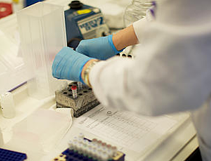
What can I expect from “microbiology” in the West Midlands?
The workload is varied: in the morning you may be required to lead the laboratory ‘bench round’ during which new potentially significant isolates are shown to you that require your clinical input. You may then go on a ward round of the intensive care unit and then review ward patients with significant positive cultures. Due to time constraints, much clinical interaction in microbiology unfortunately takes place over the telephone. You will liaise with a variety of people during your time in microbiology: hospital based clinicians, general practitioners, the infection control team, the local public health team and reference laboratories to name but a few.
As a consultant, it is vital to have an understanding of the way results of investigations are derived, so that you can act on results that do not fit the clinical picture and communicate effectively with laboratory staff about what further work to do on patient isolates. Although you will not be expected to process specimens as a consultant, it is very important that, as a trainee, you spend time in the microbiology laboratory to gain an understanding of the way the laboratory works. You will do more of this in early part of your training than later on.
You will get involved in the management of outbreaks, perhaps dealing with an increased number of wound infections from the cardiac surgical unit or of diarrhoea and vomiting on an elderly care ward for example. As you get more senior, you may end up leading root cause analysis investigations to determine the cause of a patient’s hospital-acquired infection and make recommendations about how to reduce the risk of that event happening in future. All sorts of people will seek your advice about things that you have never had to deal with previously in your medical career: “are silver-impregnated urinary catheters better than non-silver impregnated ones?”, and “someone’s baby was given the wrong breast milk from the breast milk bank, what should we do?” are examples from the author’s recent experiences. You will become adept at searching literature and make pragmatic decisions based on your increasing knowledge and experience. You may get the opportunity to evaluate new diagnostic tests and laboratory equipment – perhaps presenting your findings regionally, nationally or internationally. Quality assurance and audit is an important part of being a microbiologist, as with all medical specialties.
What personal qualities are desirable for the microbiology part of my job?
You must be able to interact effectively with everyone from hospital cleaners, junior medical staff and laboratory technical staff to senior surgeons, GPs and hospital management. Infection Prevention and Control is as much about understanding human behaviour and hospital politics as it is about the science of decontamination and organism biology. You will need persistence and patience if you want to bring about cultural change, perhaps in a unit that overuses antibiotics for example.
You should have an eye for detail and avoid jumping to conclusions; however obvious things may be at first glance, infectious diseases and patients do not read text books! Clarity of thought and expression are essential.